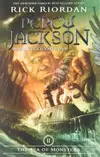Oliver Howard
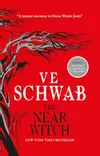
Quick read, but I felt as if it was a bit underbaked in almost all aspects. The characters felt rushed and underdeveloped, the plot itself lacked nuance and felt very predictable.
Quick read, but I felt as if it was a bit underbaked in almost all aspects. The characters felt rushed and underdeveloped, the plot itself lacked nuance and felt very predictable.
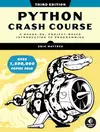
First half of this book was outstanding. Gave a great introduction to Python and was super easy to follow. As for the bigger projects in the second half of the book, I found 2/3 of them good. I ended up skipping the game creation because I didn't really feel it helped build any useful skills
First half of this book was outstanding. Gave a great introduction to Python and was super easy to follow. As for the bigger projects in the second half of the book, I found 2/3 of them good. I ended up skipping the game creation because I didn't really feel it helped build any useful skills

Tiago Forte's Building a Second Brain offers practical and actionable advice on how to create a digital system that supports your creative potential. His CODE framework for processing information keeps it simple and easy to follow along. The PARA organization system focuses not on a top-down, structured file system. Instead, it prioritizes actionability and relevance, leading to a more intuitive workflow. This organizational system worked for me, but I can see it being harder to apply for certain people. I personally found part three of this book not very helpful as it went from giving original and effective advice to more generic productivity advice that you have seen in countless other books and YouTube videos. I felt I could have skipped the section entirely and still come away with the same value from the book. Overall, if you are someone needing a digital reset, or are just curious about other digital management systems, this book is for you.
Tiago Forte's Building a Second Brain offers practical and actionable advice on how to create a digital system that supports your creative potential. His CODE framework for processing information keeps it simple and easy to follow along. The PARA organization system focuses not on a top-down, structured file system. Instead, it prioritizes actionability and relevance, leading to a more intuitive workflow. This organizational system worked for me, but I can see it being harder to apply for certain people. I personally found part three of this book not very helpful as it went from giving original and effective advice to more generic productivity advice that you have seen in countless other books and YouTube videos. I felt I could have skipped the section entirely and still come away with the same value from the book. Overall, if you are someone needing a digital reset, or are just curious about other digital management systems, this book is for you.

Sanderson not only effectively followed up an outstanding start to a series, but I think he may have created a perfect sequal that exceeds its predecessor. Everything from the first book is elevated and expanded upon. Questions I had going into this book have been answered and replaced by countless more, leaving me craving the next installment. Roshar itself feels bigger as a result of Sanderson's expert worldbuilding, with its cultures and locations getting fleshed out extensively.
Not much more can be said without spoilers, but the characters are what I feel make this book outstanding. Every single main perspective was engaging and exciting. At the end of each chapter, I would feel disappointed that my time with that character had ended temporarily, only to be reinvigorated by whatever the next character was up to.
Finally, what I think is the book's greatest feat: its third act. Never before have I read something so captivating and downright epic. I won't say any more to save from spoilers, but it truly was the most fun I have ever had reading the ending of a book.
Sanderson not only effectively followed up an outstanding start to a series, but I think he may have created a perfect sequal that exceeds its predecessor. Everything from the first book is elevated and expanded upon. Questions I had going into this book have been answered and replaced by countless more, leaving me craving the next installment. Roshar itself feels bigger as a result of Sanderson's expert worldbuilding, with its cultures and locations getting fleshed out extensively.
Not much more can be said without spoilers, but the characters are what I feel make this book outstanding. Every single main perspective was engaging and exciting. At the end of each chapter, I would feel disappointed that my time with that character had ended temporarily, only to be reinvigorated by whatever the next character was up to.
Finally, what I think is the book's greatest feat: its third act. Never before have I read something so captivating and downright epic. I won't say any more to save from spoilers, but it truly was the most fun I have ever had reading the ending of a book.

The first 50% of the book didn’t capture me right away, but beyond that I was hooked. Abercrombie takes his time with his characters and before you know it, you know each one intimately. Very good introduction and setup to a trilogy, excited to keep reading.
The first 50% of the book didn’t capture me right away, but beyond that I was hooked. Abercrombie takes his time with his characters and before you know it, you know each one intimately. Very good introduction and setup to a trilogy, excited to keep reading.

Mixed feelings on this one. While I enjoy some aspects of King's writing, some parts I really dislike. I thoroughly enjoyed his ability to include small insignificant details that contribute to a living, breathing world. What I didn't like was the constant sentence breaks that he kept doing (like this) that made some scenes hard to follow.
Aside from that I thought the plot was, well, fine. It is clear that this was his first major novel because his skills improve significantly with his later books.
Overall it was a pretty easy and enjoyable read, but lacked some substance and refinement.
Mixed feelings on this one. While I enjoy some aspects of King's writing, some parts I really dislike. I thoroughly enjoyed his ability to include small insignificant details that contribute to a living, breathing world. What I didn't like was the constant sentence breaks that he kept doing (like this) that made some scenes hard to follow.
Aside from that I thought the plot was, well, fine. It is clear that this was his first major novel because his skills improve significantly with his later books.
Overall it was a pretty easy and enjoyable read, but lacked some substance and refinement.
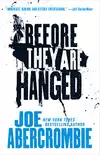
A solid follow-up to the first installment. The characters are just as complex and nuanced as ever, with some compelling development from almost the entire cast. Abercrombie effectively differentiates the characters at the start of this book from the characters at the end. It doesn't get 5 stars because the plot still feels a little hollow, serving as a bridge to the next book.
A solid follow-up to the first installment. The characters are just as complex and nuanced as ever, with some compelling development from almost the entire cast. Abercrombie effectively differentiates the characters at the start of this book from the characters at the end. It doesn't get 5 stars because the plot still feels a little hollow, serving as a bridge to the next book.
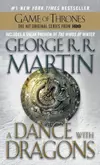
Understandable as to why fans are upset there is no book 6. Once again, great character development with unexpected twists along the way. Deeply unsettling at parts as you come to expect from Martin, but it is never unnecessary or out of place. A lot more plot-driven than AFFC, but that does not take away from deep characters and intertwined plotlines.
Understandable as to why fans are upset there is no book 6. Once again, great character development with unexpected twists along the way. Deeply unsettling at parts as you come to expect from Martin, but it is never unnecessary or out of place. A lot more plot-driven than AFFC, but that does not take away from deep characters and intertwined plotlines.
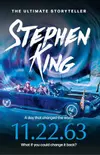
Stephen King has the uncanny ability to make me feel like I am living through his main character. I think it may be the inclusion of redundant details in his writing that make his worlds and characters feel like real things, rather than mere set dressing. To me, 11.22.63 exemplifies this skill more than any other King book I've read. I felt Jake's struggles, and more poignantly his triumphs. This book has an A and a B plot, but by the end King has masterfully intertwined them, creating one beautiful story of love, sacrifice, and small-town charm. I went into this book for the time travel plot, but I left wanting more of Jodie and its inhabitants.
"For a moment everything was clear, and when that happens you see that the world is barely there at all. Don't we all secretly know this? It's a perfectly balanced mechanism of shouts and echoes pretending to be wheels and cogs, a dreamclock chiming beneath a mystery-glass we call life. Behind it? Below it and around it? Chaos, storms. Men with hammers, men with knives, men with guns. Women who twist what they cannot dominate and belittle what they cannot understand. A universe of horror and loss surrounding a single lighted stage where mortals dance in defiance of the dark."
While I felt the beginning dragged a little bit, I was fully engaged throughout the rest of the book. This book is long, and it feels long, but the result is a more fulfilling story.
Stephen King has the uncanny ability to make me feel like I am living through his main character. I think it may be the inclusion of redundant details in his writing that make his worlds and characters feel like real things, rather than mere set dressing. To me, 11.22.63 exemplifies this skill more than any other King book I've read. I felt Jake's struggles, and more poignantly his triumphs. This book has an A and a B plot, but by the end King has masterfully intertwined them, creating one beautiful story of love, sacrifice, and small-town charm. I went into this book for the time travel plot, but I left wanting more of Jodie and its inhabitants.
"For a moment everything was clear, and when that happens you see that the world is barely there at all. Don't we all secretly know this? It's a perfectly balanced mechanism of shouts and echoes pretending to be wheels and cogs, a dreamclock chiming beneath a mystery-glass we call life. Behind it? Below it and around it? Chaos, storms. Men with hammers, men with knives, men with guns. Women who twist what they cannot dominate and belittle what they cannot understand. A universe of horror and loss surrounding a single lighted stage where mortals dance in defiance of the dark."
While I felt the beginning dragged a little bit, I was fully engaged throughout the rest of the book. This book is long, and it feels long, but the result is a more fulfilling story.















